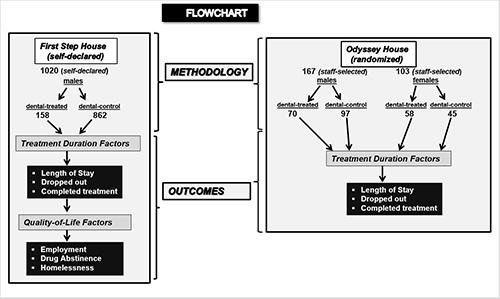A new study links the benefits of comprehensive oral care to the physical and emotional recovery of patients seeking treatment for substance use disorder

Credit: Glenn Hanson, University of Utah Health
Your smile, and associated oral health, may be a factor for successfully passing through the revolving doors of life. It is your first impression to a stranger, the closing argument to land a job and a major factor to achieving a good quality of life. For those who struggle with substance use disorder, oral health often falls off the precipice of self-care thereby seriously damaging interpersonal skills, while causing poor nutrition, increased oral and general infections and debilitating oral pain.
A team of researchers at the University of Utah School of Dentistry explored the effect of comprehensive oral care for a more holistic approach to substance use disorder treatment. Their work shows for the first time that participants who had their major oral health problems addressed by a dental professional stayed in treatment approximately two times longer and had a more than 80 percent increase in completing their substance abuse treatment program. The results of the study are available online May 20 in the Journal of the American Dental Association.
“There is a powerful synergism between oral health care and substance use disorder,” said Glen Hanson, D.D.S., Ph.D., professor of Pharmacology and Toxicology and School of Dentistry at U of U Health and first author on the paper. “Those who received comprehensive dental care had a better quality of life as measured by substantial improvements in employment and drug abstinence as well as a dramatic decrease in homelessness.”
While the study did not examine specific reasons for the different positive responses observed for the FLOSS participants compared to the controls, a statistical analysis supports the idea that the improvements in substance abuse treatment outcomes were associated with the comprehensive dental care and not to other variables such as gender, type of drug abused, treatment facility, or age.
Hanson and his team joined collaborators at two Salt Lake City substance use clinics, Odyssey House and First Step House, to develop the FLOSS (Facilitating a Lifetime of Oral Health Sustainability for Substance Use Disorder Patients and Families) program. While the project was designed to provide the next generation of dentists with the skill set to care for underserved populations, Hanson discovered the participants got much more than just an improved smile from the experience.
Between 2015 and 2017, the substance use treatment centers recruited patients for the study. First Step House allowed patients to self-select for dental care (158 males in dental and 862 males in control), while Odyssey House identified participants with major oral health problems and then randomly assigned those to treatment or control (70 males and 58 females in dental and 97 males and 45 females in control). Patients in the FLOSS program received care at the U of U Health School of Dentistry for treatments ranging from extractions to root canals, to restorations to dentures.
Hanson and his team conducted a retrospective study of the data to explore the role of FLOSS in helping patients completing their substance use programs.
After comprehensive dental care, the FLOSS participants, either self-selected or randomly selected, were more likely to continue and complete their substance use treatment program. Hanson and his colleagues believe that providing complete oral care as part of treating the whole patient, is critical to resurrecting self-esteem and restoring important body functions as an essential first step on the long path to recovery from drug abuse.
“The experience is life changing not only for the patients but also dental providers such as dental students who now know how their work can dramatically alter their patients’ lives,” Hanson said. “I think if we do the same thing for patients experiencing other chronic health problems, like diabetes, we could see similar positive results for treatment outcomes.”
###
Hanson was joined in this study by Llely Duarte, Lilliam Pinzon, Bryan Trump, Sri Koduri, Carter Bruett, Ken Smith and Huong Weeks at U of U Health; Shawn McMillen at First Step House; and Kali Mower at Odyssey House. The work received support from the National Institutes of Health National Institute on Drug Abuse and the Health Resources and Services Administration.
Media Contact
Stacy W. Kish
[email protected]




